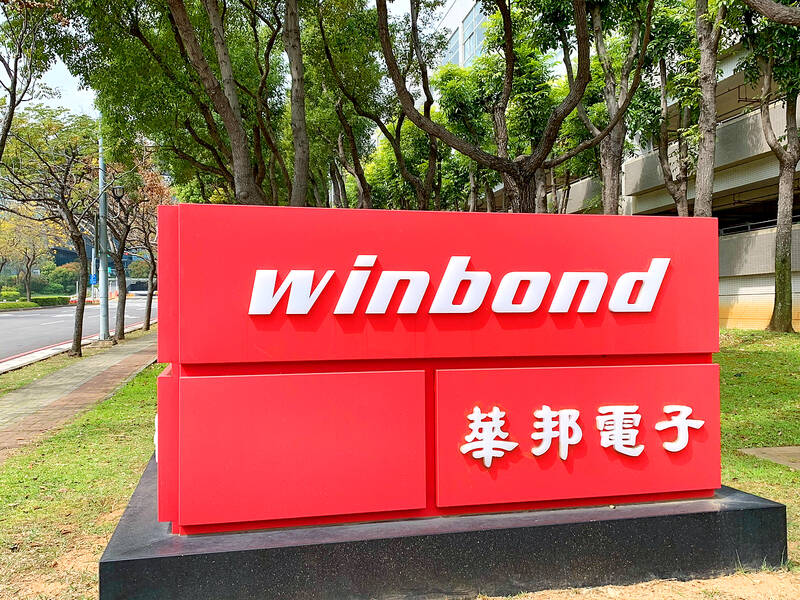Winbond Electronics Corp (華邦電) yesterday said demand for its tailor-made DRAM and NOR flash memory chips is expected to significantly pick up in the second half of this year.
The company’s new 3D memory product, dubbed CUBE, is expected to generate meaningful revenue next year, the Taichung company told an earnings conference.
The CUBE product, which is designed to stack a logic chip upon a memory chip, is cost-efficient and suitable for artificial intelligence (AI) devices with less computing power, Winbond president James Chen (陳沛銘) said.

Photo: Grace Hung, Taipei Times
The company aims to offer the product to dozens of customers, he said.
“Since DeepSeek (深度求索) launched its AI models during the Lunar New Year holiday, we have received numerous inquiries about our CUBE product,” he said.
Some analysts consider CUBE a low-density version of high-bandwidth memory chips that are used in AI devices with powerful training and inferencing abilities.
While Winbond is positive about the second half of this year, it remains precarious about overall market demand, given uncertainties related to geopolitical conflicts and US tariff threats, the company said.
“The fourth quarter last year was the trough of the year and the situation will be much better going forward,” Chen said. “In the customized DRAM segment, we are seeing strong indicators that point to a recovery” in demand.
The recovery in the communications segment, smartphones in particular, would buoy DRAM demand in the third and fourth quarters, he said.
The communications segment accounted for 24 percent of Winbond’s revenue last year, down from 25 percent in 2023 and more than 30 percent in previous years, he said.
Demand for DRAM chips used in TVs and automotive devices looks healthy, and demand for NOR flash chips used in servers appears strong, while demand for other applications such as notebook computers, smart home devices and vehicles seems stable, he said.
As multiple manufacturers exit the market, single-layer-cell NAND flash memory chips would become tight in the second half of next year, he added.
Overall, Winbond’s factory utilization rate would bounce back to nearly 100 percent this year, up from more than 80 percent in the fourth quarter of last year, he said.
Winbond reported net profit of NT$601 million (US$18.35 million) last year, compared with a net loss of NT$1.15 billion in 2023.
While the company’s earnings per share were NT$0.14, its board of directors decided not to distribute cash dividends to shareholders, it said.
Revenue last year rose 8.8 percent to NT$81.61 billion from NT$75 billion in 2023.
The chipmaker plans to spend NT$5.3 billion in new facilities and equipment this year, down about 66 percent from NT$15.5 billion last year.

Anna Bhobho, a 31-year-old housewife from rural Zimbabwe, was once a silent observer in her home, excluded from financial and family decisionmaking in the deeply patriarchal society. Today, she is a driver of change in her village, thanks to an electric tricycle she owns. In many parts of rural sub-Saharan Africa, women have long been excluded from mainstream economic activities such as operating public transportation. However, three-wheelers powered by green energy are reversing that trend, offering financial opportunities and a newfound sense of importance. “My husband now looks up to me to take care of a large chunk of expenses,

SECTOR LEADER: TSMC can increase capacity by as much as 20 percent or more in the advanced node part of the foundry market by 2030, an analyst said Taiwan Semiconductor Manufacturing Co (TSMC, 台積電) is expected to lead its peers in the advanced 2-nanometer process technology, despite competition from Samsung Electronics Co and Intel Corp, TrendForce Corp analyst Joanne Chiao (喬安) said. TSMC’s sophisticated products and its large production scale are expected to allow the company to continue dominating the global 2-nanometer process market this year, Chiao said. The world’s largest contract chipmaker is scheduled to begin mass production of chips made on the 2-nanometer process in its Hsinchu fab in the second half of this year. It would also hold a ceremony on Monday next week to

TECH CLUSTER: The US company’s new office is in the Shalun Smart Green Energy Science City, a new AI industry base and cybersecurity hub in southern Taiwan US chip designer Advanced Micro Devices Inc (AMD) yesterday launched an office in Tainan’s Gueiren District (歸仁), marking a significant milestone in the development of southern Taiwan’s artificial intelligence (AI) industry, the Tainan City Government said in a statement. AMD Taiwan general manager Vincent Chern (陳民皓) presided over the opening ceremony for the company’s new office at the Shalun Smart Green Energy Science City (沙崙智慧綠能科學城), a new AI industry base and cybersecurity hub in southern Taiwan. Facilities in the new office include an information processing center, and a research and development (R&D) center, the Tainan Economic Development Bureau said. The Ministry

ADVERSARIES: The new list includes 11 entities in China and one in Taiwan, which is a local branch of Chinese cloud computing firm Inspur Group The US added dozens of entities to a trade blacklist on Tuesday, the US Department of Commerce said, in part to disrupt Beijing’s artificial intelligence (AI) and advanced computing capabilities. The action affects 80 entities from countries including China, the United Arab Emirates and Iran, with the commerce department citing their “activities contrary to US national security and foreign policy.” Those added to the “entity list” are restricted from obtaining US items and technologies without government authorization. “We will not allow adversaries to exploit American technology to bolster their own militaries and threaten American lives,” US Secretary of Commerce Howard Lutnick said. The entities